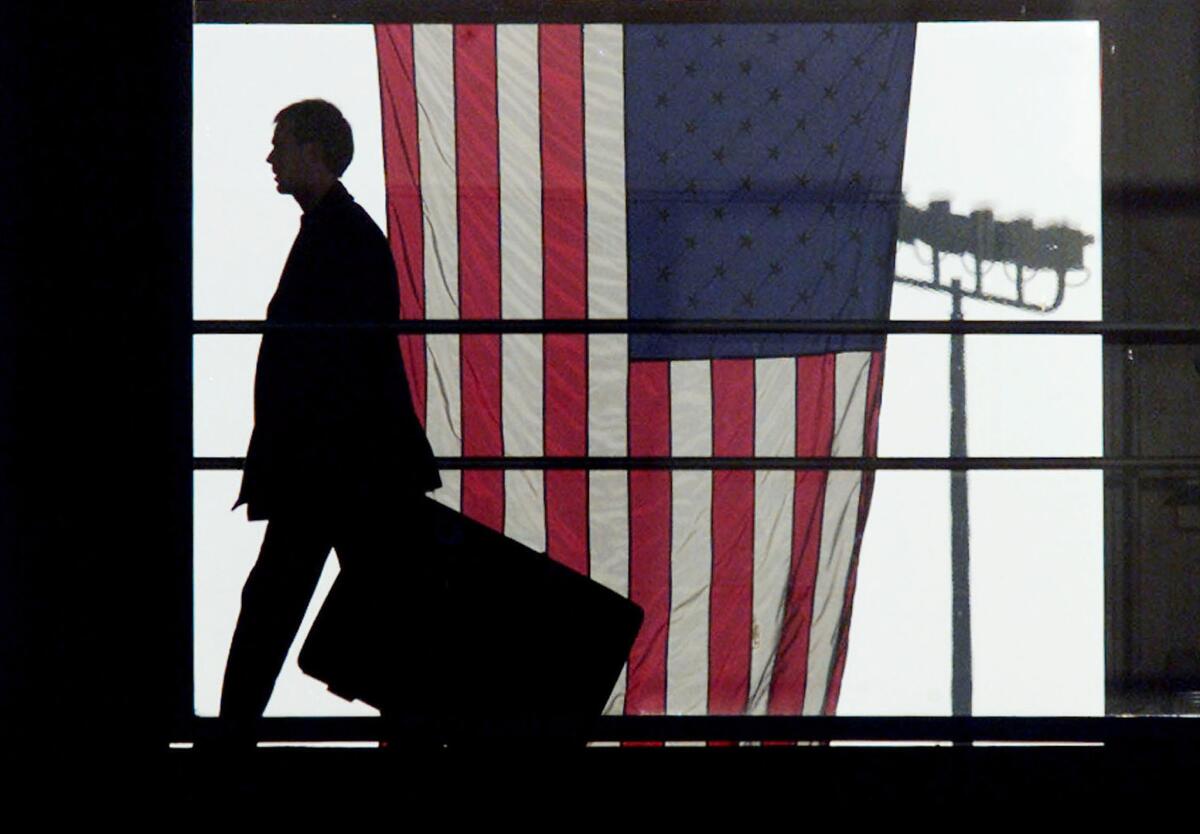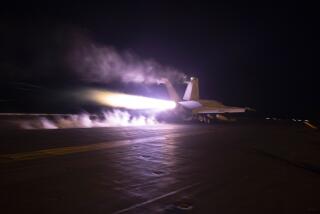Symbolic dates and Yemen strike drive fears of Al Qaeda attack

Fears of impending terrorist strikes against Western targets in the Muslim world reached fever pitch Tuesday after a U.S. drone strike in Yemen, the evacuation of diplomatic missions in Africa and Europe and the approaching end of Ramadan and symbolic anniversaries of past deadly attacks.
Extremists believed to be aligned with Al Qaeda shot down a Yemeni army helicopter, killing all eight on board headed for a central province to protect oil installations. Though thought to have been a target of opportunity rather than a carefully executed plot, the blow undermined the Sana government’s assurances to the United States and other Western countries that its forces are able to protect foreign entities in this high-risk season.
Wednesday is the end of the Muslim holy month of Ramadan, as well as the 15th anniversary of the deadly terrorist strikes on U.S. embassies in Kenya and Tanzania. The approaching 9/11 anniversary and the one-year mark since terrorists killed the U.S. ambassador and three other Americans in Benghazi, Libya, are also reportedly fueling widespread fears of new operations targeting U.S. citizens and assets.
Western intelligence has intercepted communications between Ayman Zawahiri, head of the supposedly debilitated Al Qaeda core hiding out in Pakistan, and militants of the Yemen-based Al Qaeda in the Arabian Peninsula. Zawahiri, who took over the leadership of Al Qaeda after Osama bin Laden was killed two years ago, is reportedly heard in tapped communications to be directing AQAP accomplices in planned attacks on Western targets.
The intercepts prompted the U.S. State Department to issue a worldwide terrorism alert Friday and to order the temporary closure of 21 U.S. embassies and consulates in the Middle East, Africa and South Asia. On Tuesday, Washington ordered nonessential U.S. government employees to leave Yemen because of “the continued potential for terrorist attacks.”
Most of the U.S. diplomatic venues will remain shuttered through the week as a precaution against symbolic strikes to mark coinciding dates of past militant destruction. The closures began with Sunday’s Lailat al-Qadr, or the Night of Power, an observance commemorating the revelation of the holy Koran to the prophet Muhammad that often provokes extremist acts against perceived infidels.
U.S. intelligence sources said the intercepted communication between Zawahiri and AQAP leader Nasser Wuhayshi alluded to an operation against an unspecified Western target as early as Sunday.
That Zawahiri might be trying to assert his authority over the Yemeni branch of the global terrorist network would make sense from the standpoint of the isolated and reclusive successor to Bin Laden, said Tom McDonald, former U.S. ambassador to Zimbabwe and 30-year veteran of political and corporate posts in Africa, the Middle East, Europe and Asia.
“It is certainly significant that Zawahiri has surfaced so publicly, having been underground since Bin Laden was taken out,” said McDonald, now a partner with BakerHostetler in Washington. “But whether it signifies more than a few desperate calls by a desperate man trying to show that he’s relevant, it’s too early to tell.”
Having been an ambassador in Africa during the 1998 East Africa embassy bombings and the 2000 attack on the U.S. destroyer Cole in the Yemeni port of Aden, McDonald said the risks posed by Al Qaeda were apparent at the time, but didn’t register with most Americans until Sept. 11, 2001.
Yemen has been unstable for decades, and recent indications suggest the extremists operating there have acquired new capabilities. AQAP and its reputed master bombmaker, Ibrahim Hassan Asiri, were behind the Christmas Day 2009 attempt to blow up a Detroit-bound airliner with explosives hidden in the underwear of a young Nigerian extremist, according to counter-terrorism experts.
This week’s convergence of Ramadan observances and the Aug. 7, 1998, anniversary of the embassy strikes are an attractively symbolic time for Al Qaeda to attack and remind the West that it remains a threat, McDonald said.
“Anything that will draw attention to the jihadists, something spectacular on a day that means something to them, that shows the West and the United States that they can attack at will – there is great symbolism in these dates,” said the former diplomat.
The anniversaries follow recent massive jail breaks in Iraq, Libya and Pakistan, where more than 2,000 militants, many allied with Al Qaeda, were freed to rejoin the global jihad. But counter-terrorism analysts see little connection with the alert issued Friday.
“They may have gotten a few suicide operatives out,” said Daniel Benjamin, a former State Department counter-terrorism coordinator now directing a center for security studies at Dartmouth College.
“The Al Qaeda core in Pakistan has been communicating with affiliates throughout their existence, trying to give them direction in terms of strategy,” Benjamin said. “This fits in with that practice and suggests another step as Al Qaeda in South Asia tries to dig itself out of the hole it has been in due to American actions in the region.”
In addition to the May 2011 operation to kill Bin Laden at his compound in Pakistan, U.S. troops and special forces have killed top lieutenants of the Al Qaeda core throughout their deployment in Afghanistan after 9/11.
Benjamin said the symbolism of terrorist strikes timed to coincide with previous major attacks is often overstated, but that Wednesday’s 15th anniversary of the East Africa embassy bombings, in which 223 were killed and more than 4,000 wounded, is particularly important to Al Qaeda as its first demonstration of ability to orchestrate terrorism in multiple venues.
“This is when Al Qaeda burst onto the world stage with multiple, coordinated, simultaneous attacks, which have been an Al Qaeda hallmark ever since,” he said.
The U.S. government’s closure of nearly two dozen diplomatic missions doesn’t signal that a threat exists to all of them, Benjamin said, “but it isn’t implausible that Al Qaeda would try to carry out another multiple attack at this time.”
ALSO:
Reform of Mexico oil giant Pemex stirs opposition
Most Israelis oppose peace deal with land swaps, poll finds
Sens. McCain, Graham urge release of Egypt’s jailed Islamists
A foreign correspondent for 25 years, Carol J. Williams traveled to and reported from more than 80 countries in Europe, Asia, the Middle East and Latin America.
More to Read
Start your day right
Sign up for Essential California for news, features and recommendations from the L.A. Times and beyond in your inbox six days a week.
You may occasionally receive promotional content from the Los Angeles Times.







